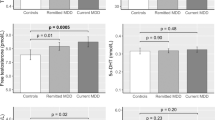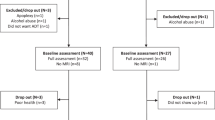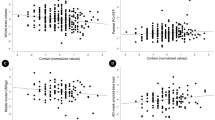Abstract
The role of androgens on cognitive function and mood is not well documented yet. We therefore evaluated all male participants (n=247, mean age 75.7 years) of a population-based study regarding testosterone, dehydroepiandrosterone sulfate (DHEAS), depression and Alzheimer Dementia (AD) for 5 years using the DSM-IV and NINCDS–ADRDA criteria. At study entry, low serum testosterone levels (<350 ng per 100 ml) were present in 45 (30.8%), low DHEAS (<50 μg per 100 ml) in 44 (30.1%), depression in 11 (7.5%) and AD in 7 (4.7%) men. After 5 years, the number of men with low testosterone levels increased to 52 (+15.5%), for low DHEAS to 57 (+29.5%) for depression to 34 (+219%) and for AD to 43 (+515%). Testosterone levels were not associated to prevalence or incidence of depression or dementia. Mean testosterone was 398.1 ng per 100 ml in depressive men and 431.7 ng per 100 ml in those without depression (P=0.57) and 406.3 ng per 100 ml in those with AD versus 429.5 ng per 100 ml without AD (P=0.66).
This is a preview of subscription content, access via your institution
Access options
Subscribe to this journal
Receive 8 print issues and online access
$259.00 per year
only $32.38 per issue
Buy this article
- Purchase on Springer Link
- Instant access to full article PDF
Prices may be subject to local taxes which are calculated during checkout

Similar content being viewed by others
References
Feldman HA, Longcope C, Derby CA, Johannes CB, Araujo AB, Coviello AD et al. Age trends in level of serum testosterone and other hormones in middle aged men: longitudinal results from the Massachusetts Male Aging Study. J Clin Endocrinol Metab 2002; 87: 589–598.
Harman SM, Metter EJ, Tobin DJ, Pearson J, Blackman MR . Longitudinal effects of aging on serum total and free testosterone levels in healthy men. J Clin Endocrinol Metab 2001; 86: 724–731.
Ferrini RL, Barrett-Connor E . Sex hormones and age: a cross-sectional study of testosterone and estradiol and their bioavailable fractios in community-dwelling men. Am J Epidemiol 1998; 147: 750–754.
Bhasin S, Cunningham GR, Hayes FC, Matsumoto AM, Snyder PJ, Swerdloff RS et al. Testosterone therapy in adult men with androgen deficiency syndromes: an Endocrine Society Clinical Practice Guideline. J Clin Endocrinol Metab 2006; 91: 1995–2010.
Wang C, Nieschlag E, Swerdloff R, Behre HM, Hellstrom JW, Gooren LG et al. ISA, ISSAM, EAU, EAA and ASA recommendations: investigation, treatment and monitoring of late-onset hypogonadism in males. Int J Impot Res 2009; 21: 1–8.
Rhoden LE, Morgenthaler A . Risks of testosterone-replacement therapy and recommendations for monitoring. N Engl J Med 2004; 350: 482–492.
Amiaz R, Seidman SN . Testosterone and depression in men. Curr Opin Endocrinol Diabetes Obes 2008; 15: 278–283.
Fuller SJ, Tan RS, Martins RN . Androgens in the etiology of Alzheimer's disease in aging men and possible therapeutic interventions. J Alzheimers Dis 2007; 12: 129–142.
Morrison MF . Androgens in the elderly: will androgen replacement therapy improve mood, cognition and quality of life in aging men and women. Psychopharmcol Bull 1997; 2: 293–295.
Livingston G, Hawkins A, Graham N, Blizard B, Mann A . The Gospel Oak Study: prevalence rates of dementia, depression and activity limitation among elderly residents in inner London. Psychol Med 1990; 20: 137–146.
Ritchie K, Kildea D . Is senile dementia age-related or aging-related? Evidence from a meta-analysis of dementia prevalence in the oldest old. Lancet 1995; 346: 931–934.
Fischer P, Jungwirth S, Zehentmayer S, Weissgram S, Hoenigschnabl S, Gelpi E et al. Conversions from subtypes of mild cognitive impairment to AD. Neurology 2007; 68: 288–291.
American Psychiatric Association. Diagnostic and Statistical Manual of Mental Disorders, 4th edn, American Psychiatric Association: Washington, DC, USA, 1994.
McKhann G, Drachman D, Folstein M, Katzmann R, Price D, Stadlan EM . Clinical diagnosis of Alzheimer's disease: report of the NINCDS-ADRDA work group under the auspices of department of health and human services task force on Alzheimer's disease. Neurology 1984; 34: 939–944.
Seidman SN, Araujo AB, Roose SP, McKinlay JB . Testosterone level, androgen receptor polymorphism and depressive symptoms in middle-aged men. Biol Psychiatry 2001; 50: 371–376.
Barrett-Connor E, Von Muhlen DG, Kritz-Silverstein D . Bioavailable testosterone and depressive mood in older men: the Rancho Bernardo Study. J Clin Endocrinol Metab 1999; 84: 573–577.
Kratzik CW, Schatzl G, Lackner JE, Lunglmayr G, Brandstätter N, Rücklinger E et al. Mood changes, body mass index and bioavailable testosterone in healthy men: results of the Androx Vienna Municipality Study. BJU Int 2007; 100: 614–618.
Booth A, Johnson DR, Granger DA . Testosterone and men's depression: the role of social behaviour. J Health Soc Behav 1999; 40: 130–140.
Makhlouf AA, Mohamed MA, Seftel AD, Niederberger C . Hypogonadism is associated with overt depression symptoms in men with erectile dysfunction. Int J Impot Res 2008; 20: 157–161.
Hogervorst E, Bandelow M, Combrinck M, Smith AD . Low free testosterone is an independent risk factor for Alzheimer disease. Exp Gerontol 2004; 39: 1633–1639.
Moffat SD . Effects of testosterone on cognitive and brain aging in elderly men. Ann NY Acad Sci 2005; 37: 80–92.
Geerlings MI, Strozyk D, Masaki K, Remaley H, Petrovich H, Ross GW et al. Endogenous sex hormones, cognitive decline and future dementia in old men. Ann Neurol 2006; 60: 346–355.
Author information
Authors and Affiliations
Corresponding author
Rights and permissions
About this article
Cite this article
Ponholzer, A., Madersbacher, S., Rauchenwald, M. et al. Serum androgen levels and their association to depression and Alzheimer dementia in a cohort of 75-year-old men over 5 years: results of the VITA study. Int J Impot Res 21, 187–191 (2009). https://doi.org/10.1038/ijir.2009.10
Received:
Revised:
Accepted:
Published:
Issue Date:
DOI: https://doi.org/10.1038/ijir.2009.10
Keywords
This article is cited by
-
Metabolomics and cognition in African American adults in midlife: the atherosclerosis risk in communities study
Translational Psychiatry (2017)
-
Low Testosterone Level and Risk of Alzheimer’s Disease in the Elderly Men: a Systematic Review and Meta-Analysis
Molecular Neurobiology (2016)



